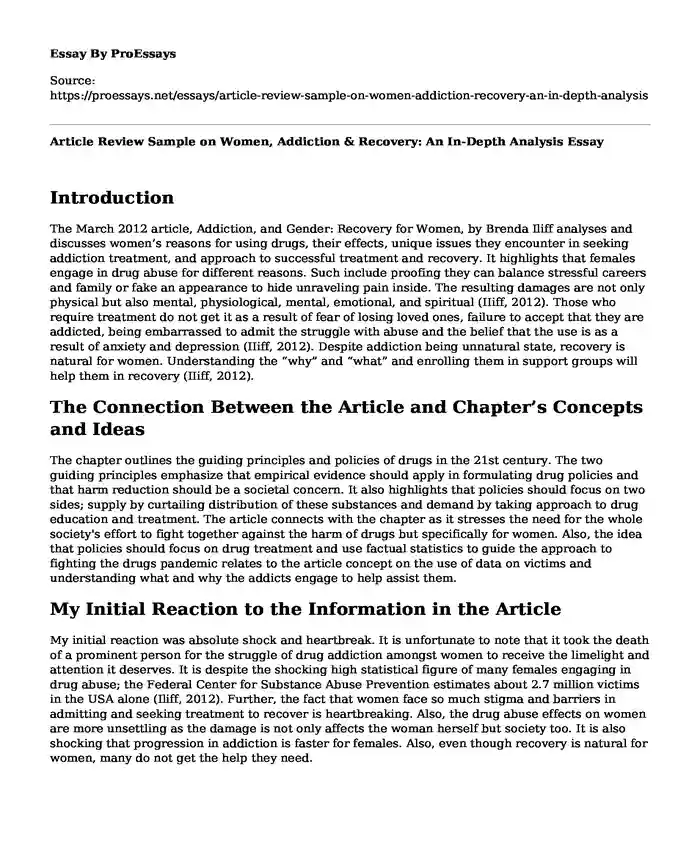Introduction
The March 2012 article, Addiction, and Gender: Recovery for Women, by Brenda Iliff analyses and discusses women’s reasons for using drugs, their effects, unique issues they encounter in seeking addiction treatment, and approach to successful treatment and recovery. It highlights that females engage in drug abuse for different reasons. Such include proofing they can balance stressful careers and family or fake an appearance to hide unraveling pain inside. The resulting damages are not only physical but also mental, physiological, mental, emotional, and spiritual (IIiff, 2012). Those who require treatment do not get it as a result of fear of losing loved ones, failure to accept that they are addicted, being embarrassed to admit the struggle with abuse and the belief that the use is as a result of anxiety and depression (IIiff, 2012). Despite addiction being unnatural state, recovery is natural for women. Understanding the “why” and “what” and enrolling them in support groups will help them in recovery (IIiff, 2012).
The Connection Between the Article and Chapter’s Concepts and Ideas
The chapter outlines the guiding principles and policies of drugs in the 21st century. The two guiding principles emphasize that empirical evidence should apply in formulating drug policies and that harm reduction should be a societal concern. It also highlights that policies should focus on two sides; supply by curtailing distribution of these substances and demand by taking approach to drug education and treatment. The article connects with the chapter as it stresses the need for the whole society's effort to fight together against the harm of drugs but specifically for women. Also, the idea that policies should focus on drug treatment and use factual statistics to guide the approach to fighting the drugs pandemic relates to the article concept on the use of data on victims and understanding what and why the addicts engage to help assist them.
My Initial Reaction to the Information in the Article
My initial reaction was absolute shock and heartbreak. It is unfortunate to note that it took the death of a prominent person for the struggle of drug addiction amongst women to receive the limelight and attention it deserves. It is despite the shocking high statistical figure of many females engaging in drug abuse; the Federal Center for Substance Abuse Prevention estimates about 2.7 million victims in the USA alone (Iliff, 2012). Further, the fact that women face so much stigma and barriers in admitting and seeking treatment to recover is heartbreaking. Also, the drug abuse effects on women are more unsettling as the damage is not only affects the woman herself but society too. It is also shocking that progression in addiction is faster for females. Also, even though recovery is natural for women, many do not get the help they need.
Details About Article and Its Impact
It is interesting to note how gender responsibilities and societal expectations limit a woman’s journey to recovery. Many women struggle with drug abuse in silence. The contents from the article have also proven ageless as the challenges highlighted still face our women today, as women still are the fastest-growing segment for substance use to date. Women face unique issues in dealing with addiction hence the need to be specific in fixing the problem.
The article’s information is an eye-opener for me. I now understand that substance abuse among women is a big problem that needs an immediate solution. I have also adopted a strategic way of thinking instead of stereotyping. My approach is to seek to understand the context and driver of the problem using empirical evidence then play the part of solving it.
Conclusion
It is clear that contrary to the common belief, women can and do struggle with drug misuse and addiction challenges. Not only is it a personal problem, but an entire society's issue. Everyone should fight against the demon. I have learned not to impose judgment on addicts but instead look for the signs for any woman trapped in addiction and encourage them to seek help. With the right treatment and recovery programs, women can find recovery.
References
Iliff, B. (2012, March 22). Addiction and Gender: Recovery for Women. Retrieved July 25, 2020, from https://www.psychologytoday.com/us/blog/remarkable-recovery/201203/addiction-and-gender-recovery-women
Cite this page
Article Review Sample on Women, Addiction & Recovery: An In-Depth Analysis. (2023, Oct 15). Retrieved from https://proessays.net/essays/article-review-sample-on-women-addiction-recovery-an-in-depth-analysis
If you are the original author of this essay and no longer wish to have it published on the ProEssays website, please click below to request its removal:
- Parent's Guide to the Admission, Review, and Dismissal Process Paper Example
- Essay Sample on Teaching Learning and Assessment
- Case Study on Substance Abuse Disorder: Examining Kyle's Unusual Behavior
- Research Paper on Violence in Schools: Physical, Psychological and Sexual Harms
- Term Paper on Teaching Reading: Cognitive Development & Comprehension
- UN Outlines Human Rights For Health Care of Offenders - Essay Sample
- Essay Example on Unlock Literacy Skills With English Literature: A Must for Schools







